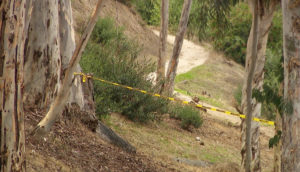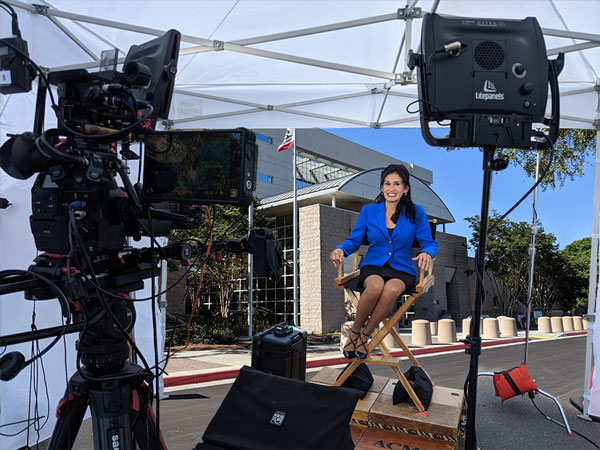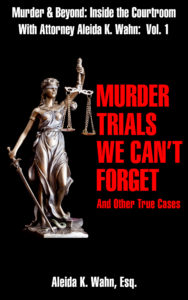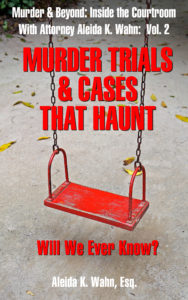
Police Questioning of Juveniles Arose In A Recent Murder Case
When I first heard the news in November of 2020 that a woman had been murdered on a local hiking trail only 20 miles from my home, I was stunned. I soon learned Lisa Thorborg, a 68-year-old widow had just moved from Oregon to San Diego in May to live with her daughter’s family. The beloved grandmother liked to hike and just weeks before her death was looking for a hiking partner. Tragically, she did not have that partner on the Monday morning of November 23rd as she headed out to hike the Hosp Grove Trail in the coastal town of Carlsbad, California, only blocks from her house. The story hit me deeply, first for the senseless loss of the life of a beautiful lady, and then because of my own penchant for hiking alone when I am unable to find a hiking partner. This past year, my hiking ventures had become a focal part of my life after a daring friend invited me to sign up for a trek to Mount Everest Base Camp and with a quest to first hike California’s Mount Whitney. As I followed the case, I was shocked and saddened to hear a 17-year-old boy had been arrested for the crime. As an attorney, true crime writer, and legal analyst of criminal cases, I knew this was a case I would follow. In December, I was granted access to the juvenile court hearing and I wrote a story on the case as it stands so far. You may read my story at: https://aleidalaw.com/the-unthinkable-a-hiker-murdered-and-a-teen-accused/





After the court hearing, I decided I would go to the hiking trail to see it for myself. Not wanting to go alone, I recruited a close friend to accompany me. As we hiked the trail, she asked me some interesting questions about juvenile law and police questioning of juveniles. After our discussion, I decided I would write a blog post about her questions. But before I address her specific issues, I thought it would be helpful to review the 1967 landmark case of In Re Gault, which was a turning point for juvenile rights.
The Constitutional Rights of Children: In re Gault
On May 15, 1967, the United States Supreme Court issued their ruling in the case of In re Gault (1967) 387 U.S. 1. Gerard Gault was a 15-year-old boy in Arizona who was arrested for making lewd telephone calls to a neighbor, Ms. Cook. At the time of his arrest, his parents were at work and were never notified their son had been taken into custody. The petition was never served on the Gaults and did not contain any factual basis. After hearings before a juvenile court judge, where no witnesses testified, including the accuser Ms. Cook, Gault was found guilty and sent to the State Industrial School for the period of his minority.
The case eventually was taken all the way to the United States Supreme Court which found Gault’s commitment a violation of the Fourteenth Amendment and ruled juveniles in delinquency proceedings have the same due process rights guaranteed under the Fourteenth Amendment as adults. Those rights include:
- The right to be formally notified of the charges
- The right to have the charges set forth with particularity
- The right to counsel
- The right against self-incrimination
- The right to confront and cross-examine witnesses
Through the years, courts and legislation have continued to provide further protections to juveniles. This year, a new California law was enacted to protect children in police custody, which I will discuss more fully as I answer my friend’s questions.
Is Police Questioning of Juveniles without a Parent’s Consent or Presence Permitted?
Yes, police questioning of juveniles without a parent’s consent is permitted. Neither does a juvenile have a constitutional right to have a parent present. However, upon taking a juvenile into custody, law enforcement must advise the juvenile of his or her Miranda rights. Further, new California law, effective January 1, 2021, mandates a juvenile 17 years and younger when in police custody must first consult with an attorney before any questioning may commence or any Miranda rights may be waived. I will delve into this law more fully below.
Do Police Have to Advise the Juvenile of the Right to an Attorney?
Yes. A Miranda warning must be given any time a law enforcement officer takes a child under 18 into custody. The Miranda warnings arose under the seminal case Miranda v. Arizona (1966) 384 U.S. 436, in which the United States Supreme Court ruled a person “taken into custody or otherwise deprived of his freedom of action in any significant way” must be informed of their constitutional rights. These rights, now known as “Miranda warnings” provide:
- You have the right to remain silent
- Anything you say can and will be used against you in a court of law
- You have the right to an attorney
- If you cannot afford an attorney, one will be appointed for you
Is Police Questioning of Juveniles Without an Attorney Permitted? And Are Juveniles Deemed Competent to Waive Their Right to an Attorney?
If the juvenile is not in custody, police questioning of juveniles is permitted without giving a Miranda warning and without an attorney present.
However, when the juvenile is in custody, under new law codified in Welfare and Institutions Code Section 625.6, a juvenile 17 years or younger may not be questioned by police or waive his or her Miranda rights until the juvenile has first consulted with an attorney. This consult may be done in person, by telephone, or by video. The consultation requirement cannot be waived. It is an absolute mandate. This statute, when originally enacted in 2018, applied solely to juveniles 15 years and younger. However, effective January 1, 2021, the law has now been expanded to include juveniles 17 years and younger. (Senate Bill 203, approved by the Governor Gavin Newson on September 30, 2020). After consultation with an attorney, who will assuredly advise to remain silent, the juvenile may nonetheless decide to talk to police. A juvenile may waive his or her constitutional rights as long as the waiver is voluntary.
There is however an exception to the attorney consultation requirement when there is an “imminent threat.” Both of the following elements must be met:
- The officer who questioned the youth reasonably believed the information he or she sought was necessary to protect life or property from imminent threat; and
- The officer’s questions were limited to those questions that were reasonably necessary to obtain that information.
When is a Juvenile Considered in Custody? And What is a Custodial Interrogation?
A juvenile is considered in custody if he or she is deprived of his or her freedom in a significant way or when the juvenile has a reasonable belief he or she is not free to leave. A child’s age must also be considered in the custody analysis under the United States Supreme Court ruling in J.D.B. v. North Carolina (2011) 564 U.S. 261
A custodial interrogation is one in which the juvenile is in custody (see above) and is subjected to law enforcement questioning. The questioning can be direct questions or even comments by an officer that the officer should know are likely to produce an incriminating response.
Should My Child Speak to the Police?
Juveniles do not have to speak to the police. They merely need to say, “I invoke my right to remain silent” or “I want to speak to an attorney” or both. Upon invocation of these rights, police questioning of juveniles may not commence.
About Aleida K. Wahn, Esq.


I am an attorney, award-winning true crime writer, and legal analyst of criminal cases. I cover criminal trials and write stories and books about compelling, gripping, and unforgettable cases that impact our world. I take you into the courtroom in high-profile murder trials, rape cases, crimes of passion, cases involving mental illness, deviant behavior, and more. I have a deep passion for true crime, criminal law, and all aspects of the criminal justice system. I have appeared as an expert on true crime shows, including “48 Hours,” “Snapped,” "Peacock TV's Tik Tok Star Murders," and “The Dead Files,” and provided legal analysis on high-profile criminal trials on Court TV, the Law & Crime Trial Network, Fox 5 News, ABC 10 News, and KUSI News. I also create and host shows with the Del Mar Television Producers Group, addressing criminal justice and social issues in recent criminal trials.
I provided my insight and legal analysis on Court TV and the Law & Crime Trial Network of the high-profile trial of former NFL star Kellen Winslow Jr. It was a trial that captured the nation as the heralded ex-football star with fame, fortune, and a famous name stood accused of multiple rapes and other sex crimes involving five women. As the trial delved into shocking facts, complicated legal issues, and unexpected twists and turns, I was there for every minute. After the trial, I wrote a book on the case, going behind the headlines to share the extraordinary details of what happened inside the courtroom. Judging Winslow Jr.: From NFL Star to Serial Rapist? Inside the Shocking Rape Trial of Kellen Boswell Winslow II is now available on Amazon.
I am passionate about telling true crime stories, as these penetrating stories have the power to move us all, while highlighting societal issues which need to be addressed. I have personally seen the human devastation which is present in each trial and believe there is a lesson to be learned in every single case. It is through awareness and examining critical issues society can effect change and even make new laws. To learn more, please visit: https://www.aleidalaw.com.
Read about the gripping and unforgettable trials that I have covered in my latest books:





